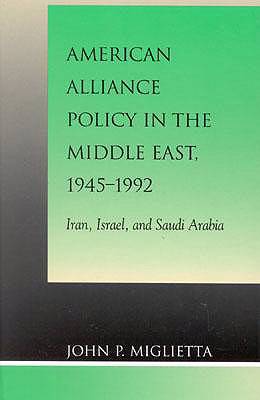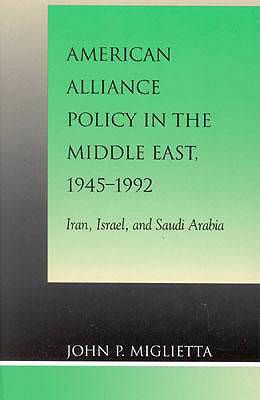
Bedankt voor het vertrouwen het afgelopen jaar! Om jou te bedanken bieden we GRATIS verzending (in België) aan op alles gedurende de hele maand januari.
- Afhalen na 1 uur in een winkel met voorraad
- In januari gratis thuislevering in België
- Ruim aanbod met 7 miljoen producten
Bedankt voor het vertrouwen het afgelopen jaar! Om jou te bedanken bieden we GRATIS verzending (in België) aan op alles gedurende de hele maand januari.
- Afhalen na 1 uur in een winkel met voorraad
- In januari gratis thuislevering in België
- Ruim aanbod met 7 miljoen producten
Zoeken
American Alliance Policy in the Middle East, 1945-1992
Iran, Israel, and Saudi Arabia
John P Miglietta
Hardcover | Engels
€ 274,95
+ 549 punten
Omschrijving
American Alliance Policy in the Middle East provides a stimulating, new look at a U.S. Cold War foreign policy gripped by anticommunist paranoia. Through case studies of America's relationships with Iran, Israel, and Saudi Arabia, John P. Miglietta reveals how an overriding fear of global communism led to the overcommitment of U.S. security resources to the region. The perceived need to preserve Middle East stability rendered U.S. policy ineffectual and unresponsive to changing local conditions, drastically altering the patron-client paradigm to the detriment of American strategic interests. This superb analysis of American foreign policymaking illustrates how Cold War anticommunist ideology prevented the evolution of traditional military alliances into broader-based relationships and perpetuated authoritarian regimes that mired the Middle East in a cycle of poverty and despotism.
Specificaties
Betrokkenen
- Auteur(s):
- Uitgeverij:
Inhoud
- Aantal bladzijden:
- 360
- Taal:
- Engels
Eigenschappen
- Productcode (EAN):
- 9780739103043
- Verschijningsdatum:
- 1/08/2002
- Uitvoering:
- Hardcover
- Formaat:
- Genaaid
- Afmetingen:
- 162 mm x 227 mm
- Gewicht:
- 662 g

Alleen bij Standaard Boekhandel
+ 549 punten op je klantenkaart van Standaard Boekhandel
Beoordelingen
We publiceren alleen reviews die voldoen aan de voorwaarden voor reviews. Bekijk onze voorwaarden voor reviews.









